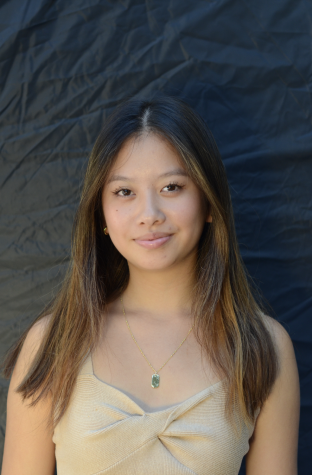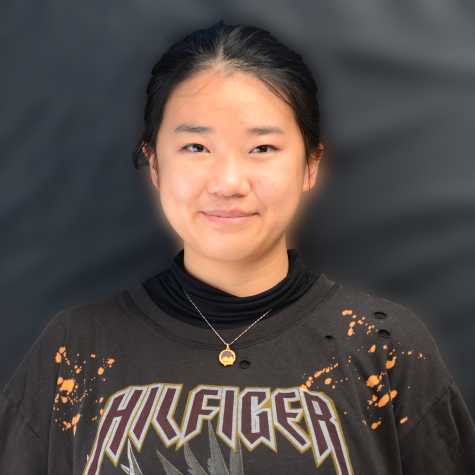Podcasting from home
Student-produced podcasts like “Jock of All Trades” and those created by the Harker Podcast Network are becoming increasingly popular forms of entertainment for students during remote learning.
November 4, 2020
Four students crouch in the back of the journalism room, their heads close together. A Blue Yeti microphone is barely visible, hidden at the center of their tight huddle. A voice speaks up.
“Hey everyone! Welcome to the fifth edition of Jock of All Trades.
Jock of All Trades, a play on the phrase “Jack of All Trades,” is a sports podcast hosted by senior Kushal Shah and juniors Muthu Panchanatham, Vishnu Kannan and Saurav Tewari. Each episode, the students discuss current events occurring in both professional sports and Harker sports.
“We just bounce ideas off of each other and talk about what’s going on in the world of sports, including anything interesting that happens and any topics of debate,” Muthu said.
Though the final product is a smooth package of narration, humor and information, the process of making podcasts itself is not an easy one. From writing scripts to recording episodes, just one production can take weeks to finish.
“It takes a week to script and another week to record and edit things together. By that time, anything could’ve happened in the sports world. So, things become out of date and we have to rerecord … it just enforces that efficiency is key. You really need to get things done on time,” Muthu said.
In the future, the team is hoping to make episodes more frequently and follow a consistent schedule. They also want to explore a wider range of sports, outside of just basketball and football.
“A lot of it has to do with our knowledge; we know a lot about the NBA and NFL already,” Muthu said. “I think definitely in the future, we can start learning about different sports and start talking about them.”
Back in the classroom, the students would record with a single Blue Yeti microphone. However, since the beginning of quarantine and social distancing, they have adapted their format.
“Because we’re at home, we usually just record Zoom meetings, and we edit the cuts together and create takes,” Muthu said. The team members all join Zoom meetings together and record them, including not only audio, but also video.
Students of the Harker Podcast Network (HPN) face similar challenges in this coming school year. HPN, a student-led organization, makes business-related podcasts for the Harker community.
This year, the team wants to add some light-hearted podcasts, which inspired Anya Warrier (11), one of HPN’s Senior Production Managers, to create one with a more humorous theme, highlighting stories from members of the student body.
“[Our upcoming episode is] going to be about embarrassing moments in high school,” Anya said. “Basically, we have a couple of upperclassmen and alumni who are going to talk about their funniest moments at Harker.”
Anya believes that this podcast can be both informational and entertaining for her audience. Even with a virtual format, she expects that it will still be enjoyable and even hopes that people will listen to more podcasts at home.
At HPN, production occurs in teams of two. Each pair will plan out the podcast, thinking about interviewees and stories, before an episode can be released to the Harker community.
However, like the students hosting “Jock of All Trades,” HPN will need to overcome some challenges that have arisen with the pandemic.
“It is kind of difficult not to be able to record with someone in person,” Anya said. “It’s definitely going to be easier to talk to someone face to face rather than online.”
Business and entrepreneurship teacher and HPN advisor, Michael Acheatal, is optimistic that HPN will be able to work through these difficulties.
“It’s just things we have to think about differently and create a new plan for,” Acheatal said. “We’re figuring out new ways to do things, and if everybody stays positive and open-minded and willing to learn new things, we’ll get through it just fine.”


















![“[Building nerf blasters] became this outlet of creativity for me that hasn't been matched by anything else. The process [of] making a build complete to your desire is such a painstakingly difficult process, but I've had to learn from [the skills needed from] soldering to proper painting. There's so many different options for everything, if you think about it, it exists. The best part is [that] if it doesn't exist, you can build it yourself," Ishaan Parate said.](https://harkeraquila.com/wp-content/uploads/2022/08/DSC_8149-900x604.jpg)




![“When I came into high school, I was ready to be a follower. But DECA was a game changer for me. It helped me overcome my fear of public speaking, and it's played such a major role in who I've become today. To be able to successfully lead a chapter of 150 students, an officer team and be one of the upperclassmen I once really admired is something I'm [really] proud of,” Anvitha Tummala ('21) said.](https://harkeraquila.com/wp-content/uploads/2021/07/Screen-Shot-2021-07-25-at-9.50.05-AM-900x594.png)







![“I think getting up in the morning and having a sense of purpose [is exciting]. I think without a certain amount of drive, life is kind of obsolete and mundane, and I think having that every single day is what makes each day unique and kind of makes life exciting,” Neymika Jain (12) said.](https://harkeraquila.com/wp-content/uploads/2017/06/Screen-Shot-2017-06-03-at-4.54.16-PM.png)








![“My slogan is ‘slow feet, don’t eat, and I’m hungry.’ You need to run fast to get where you are–you aren't going to get those championships if you aren't fast,” Angel Cervantes (12) said. “I want to do well in school on my tests and in track and win championships for my team. I live by that, [and] I can do that anywhere: in the classroom or on the field.”](https://harkeraquila.com/wp-content/uploads/2018/06/DSC5146-900x601.jpg)
![“[Volleyball has] taught me how to fall correctly, and another thing it taught is that you don’t have to be the best at something to be good at it. If you just hit the ball in a smart way, then it still scores points and you’re good at it. You could be a background player and still make a much bigger impact on the team than you would think,” Anya Gert (’20) said.](https://harkeraquila.com/wp-content/uploads/2020/06/AnnaGert_JinTuan_HoHPhotoEdited-600x900.jpeg)

![“I'm not nearly there yet, but [my confidence has] definitely been getting better since I was pretty shy and timid coming into Harker my freshman year. I know that there's a lot of people that are really confident in what they do, and I really admire them. Everyone's so driven and that has really pushed me to kind of try to find my own place in high school and be more confident,” Alyssa Huang (’20) said.](https://harkeraquila.com/wp-content/uploads/2020/06/AlyssaHuang_EmilyChen_HoHPhoto-900x749.jpeg)








